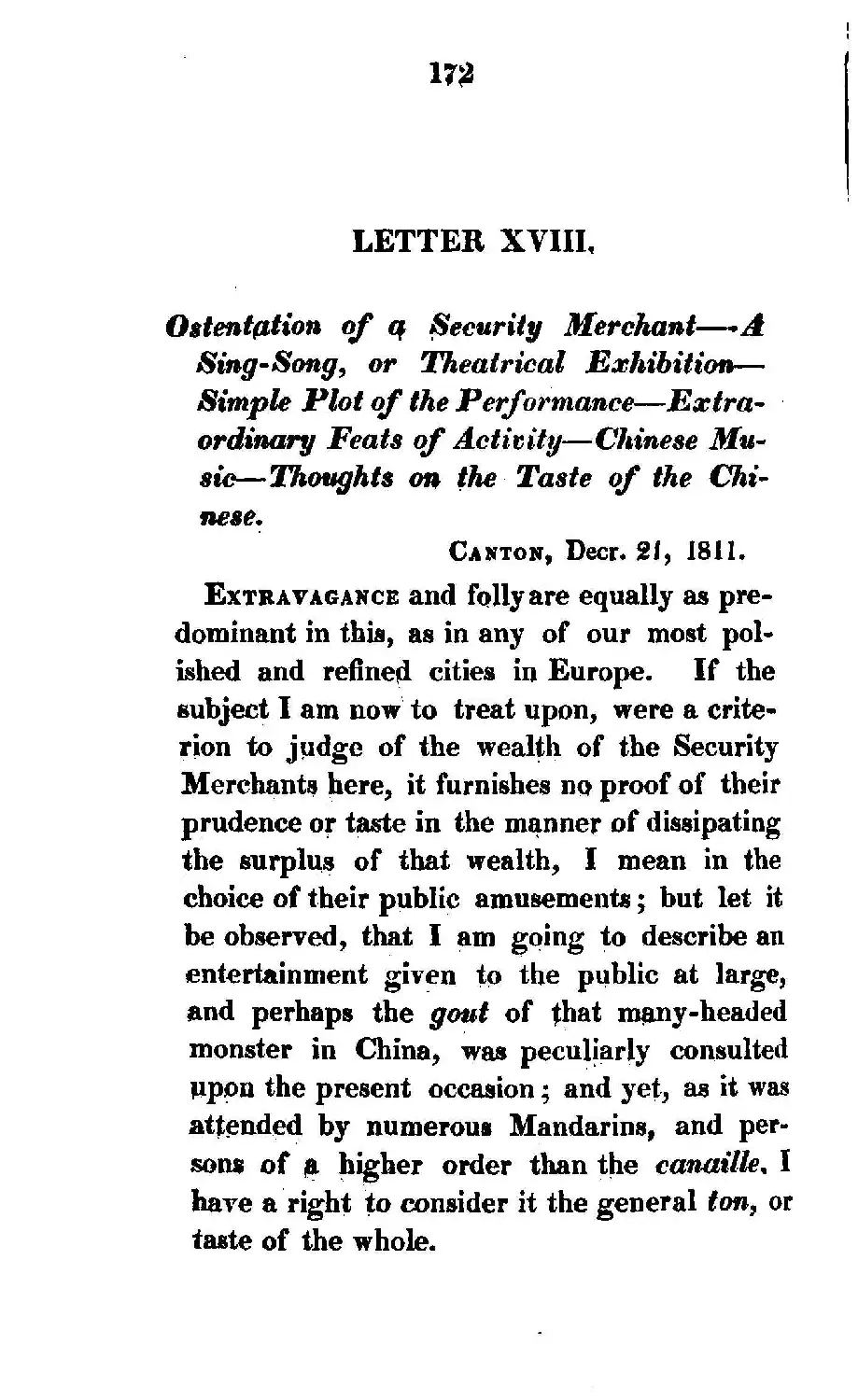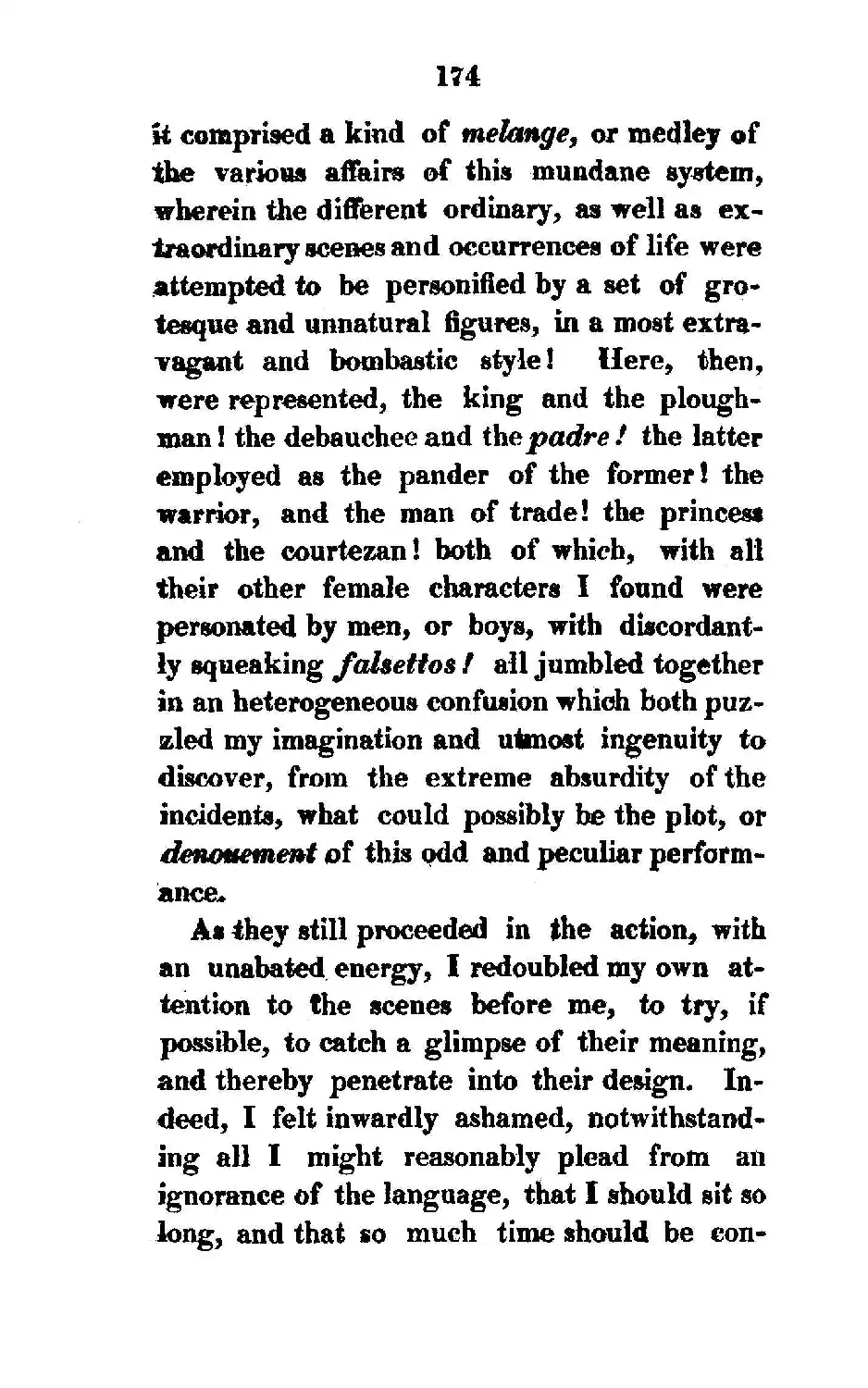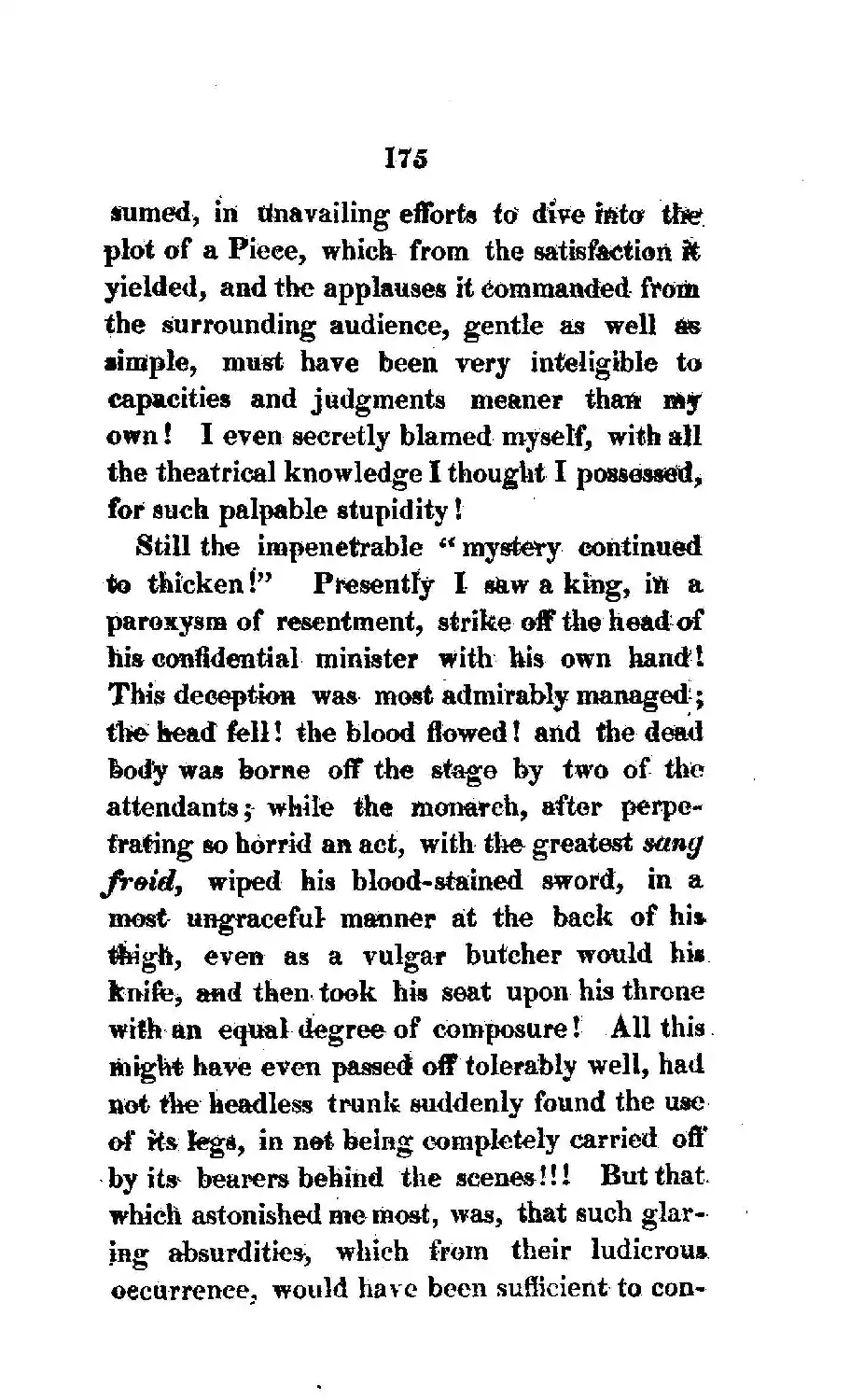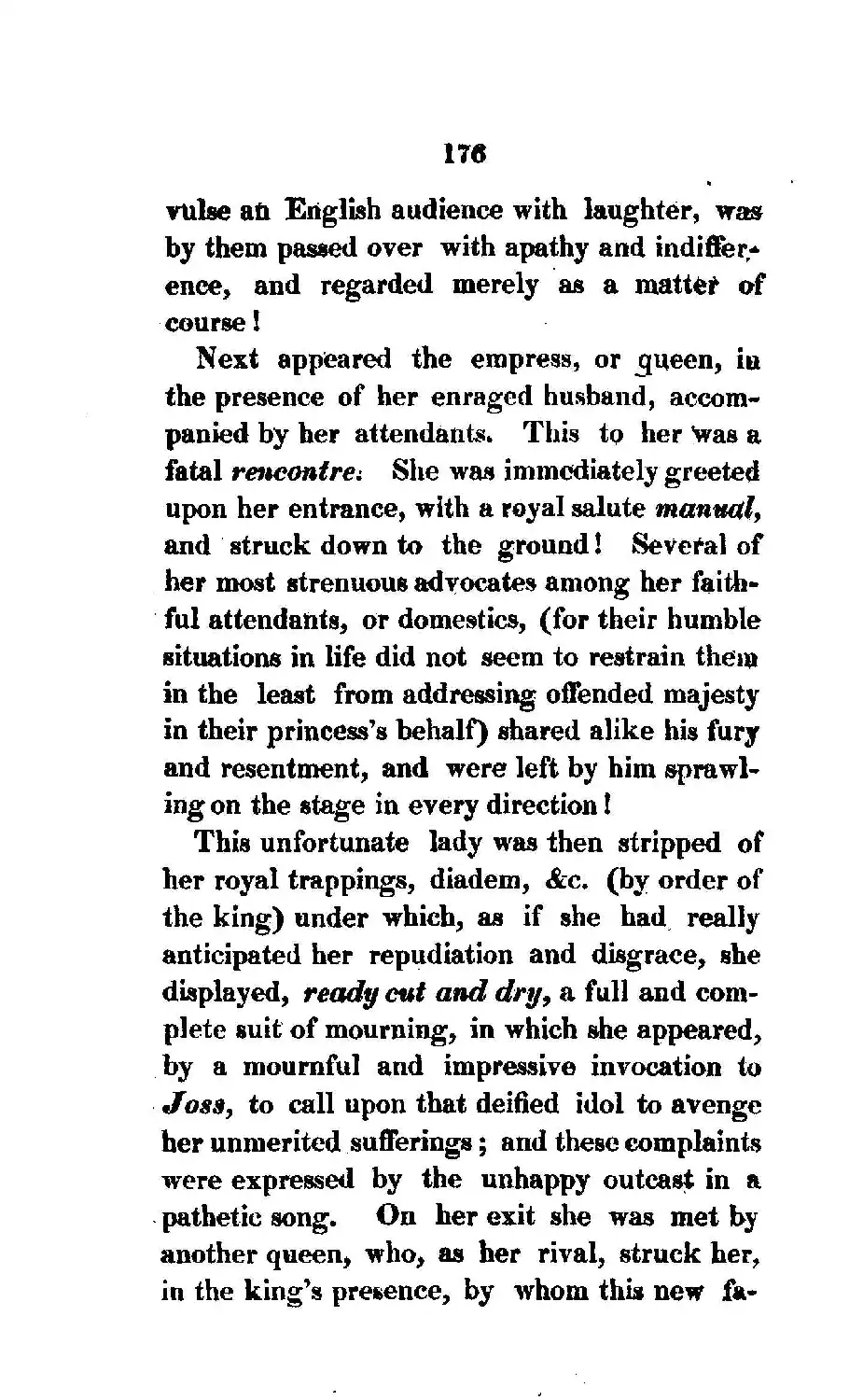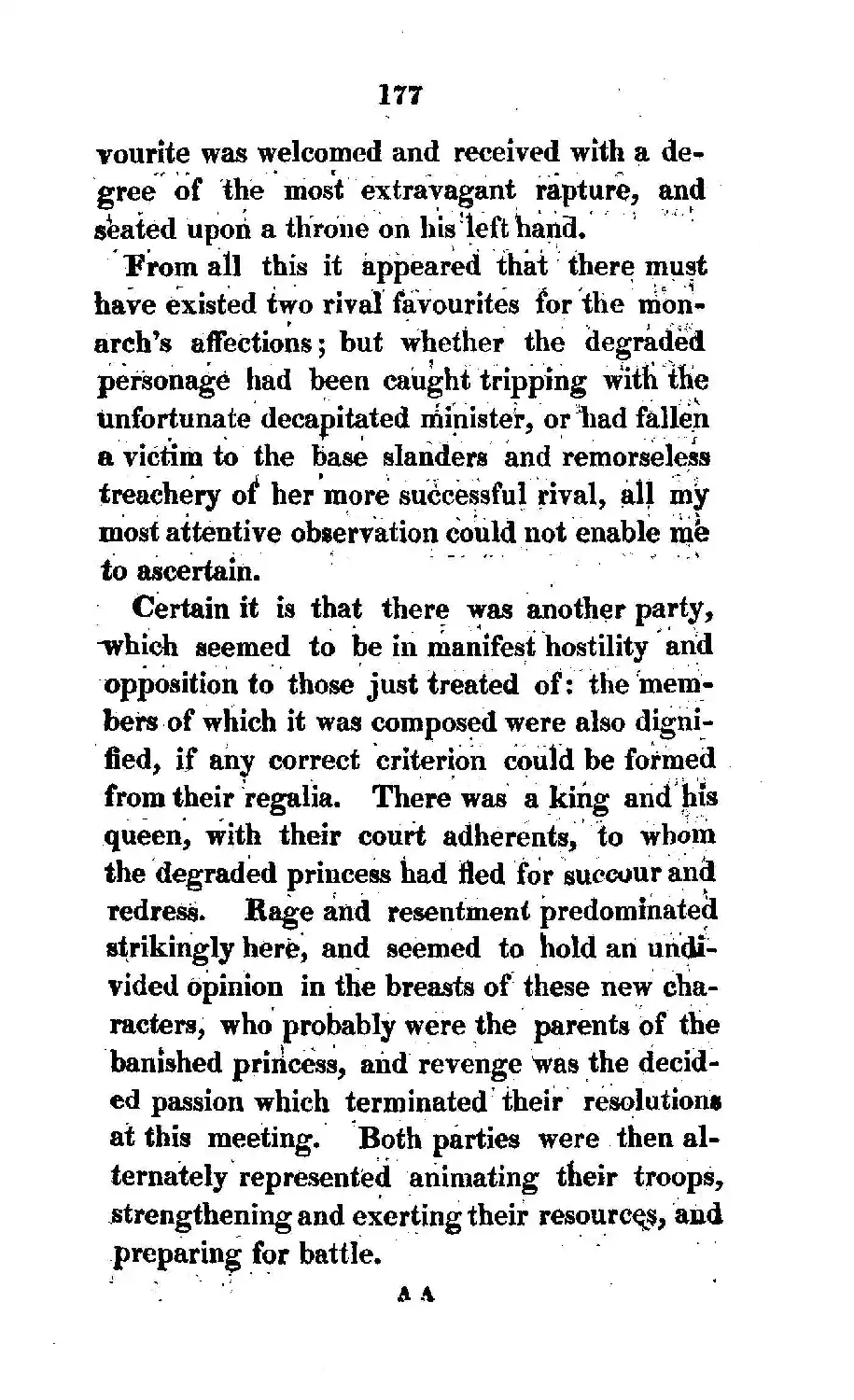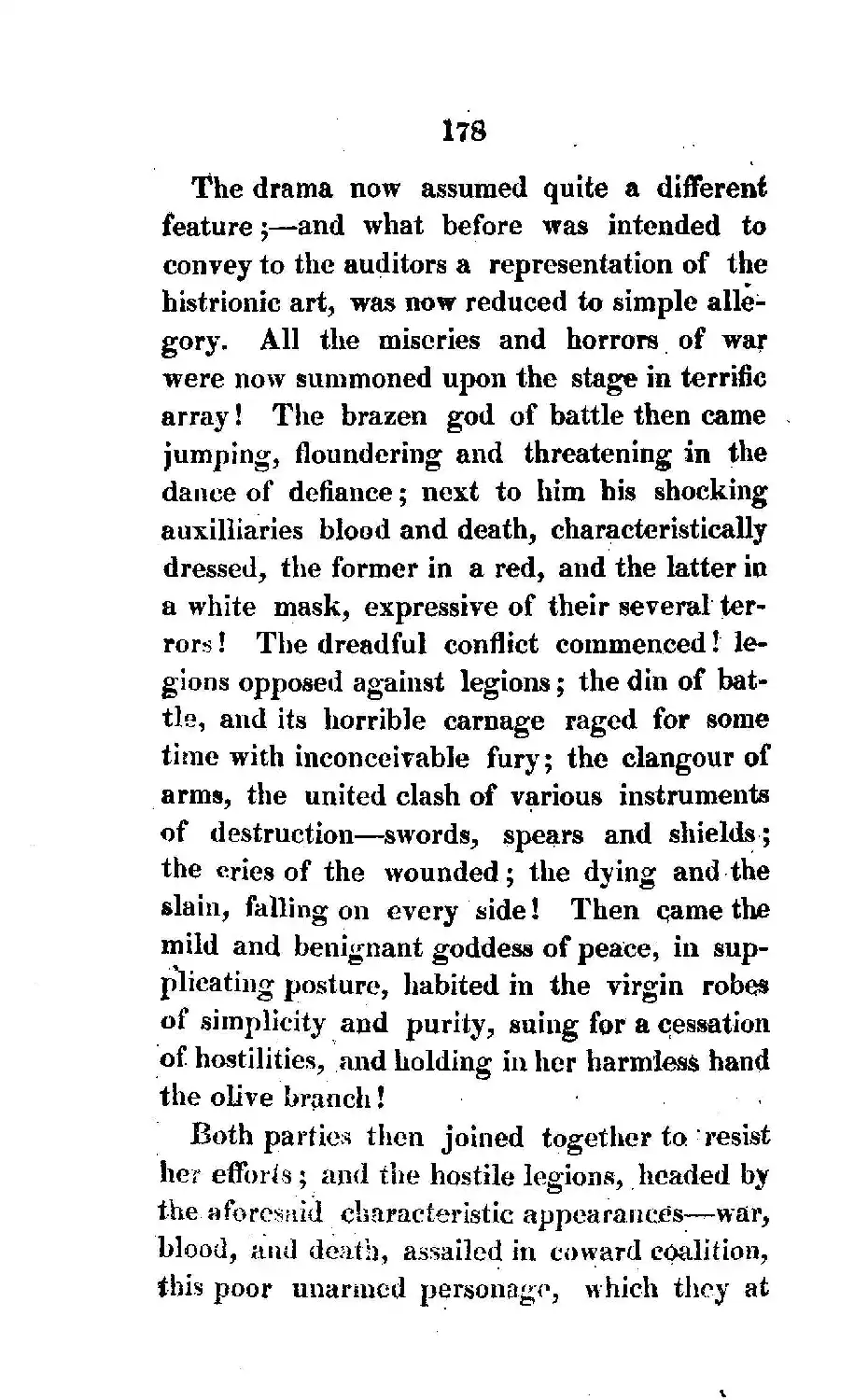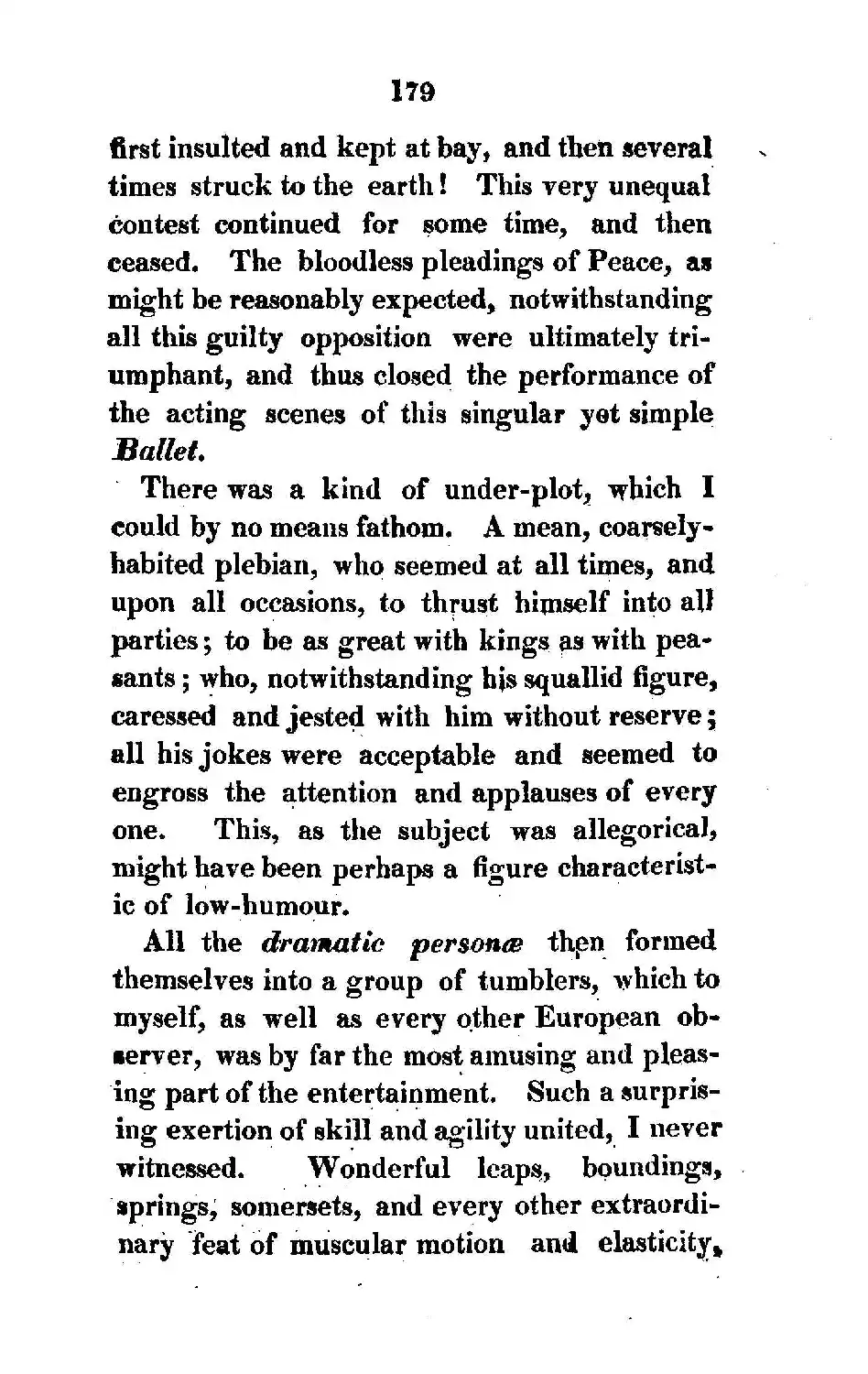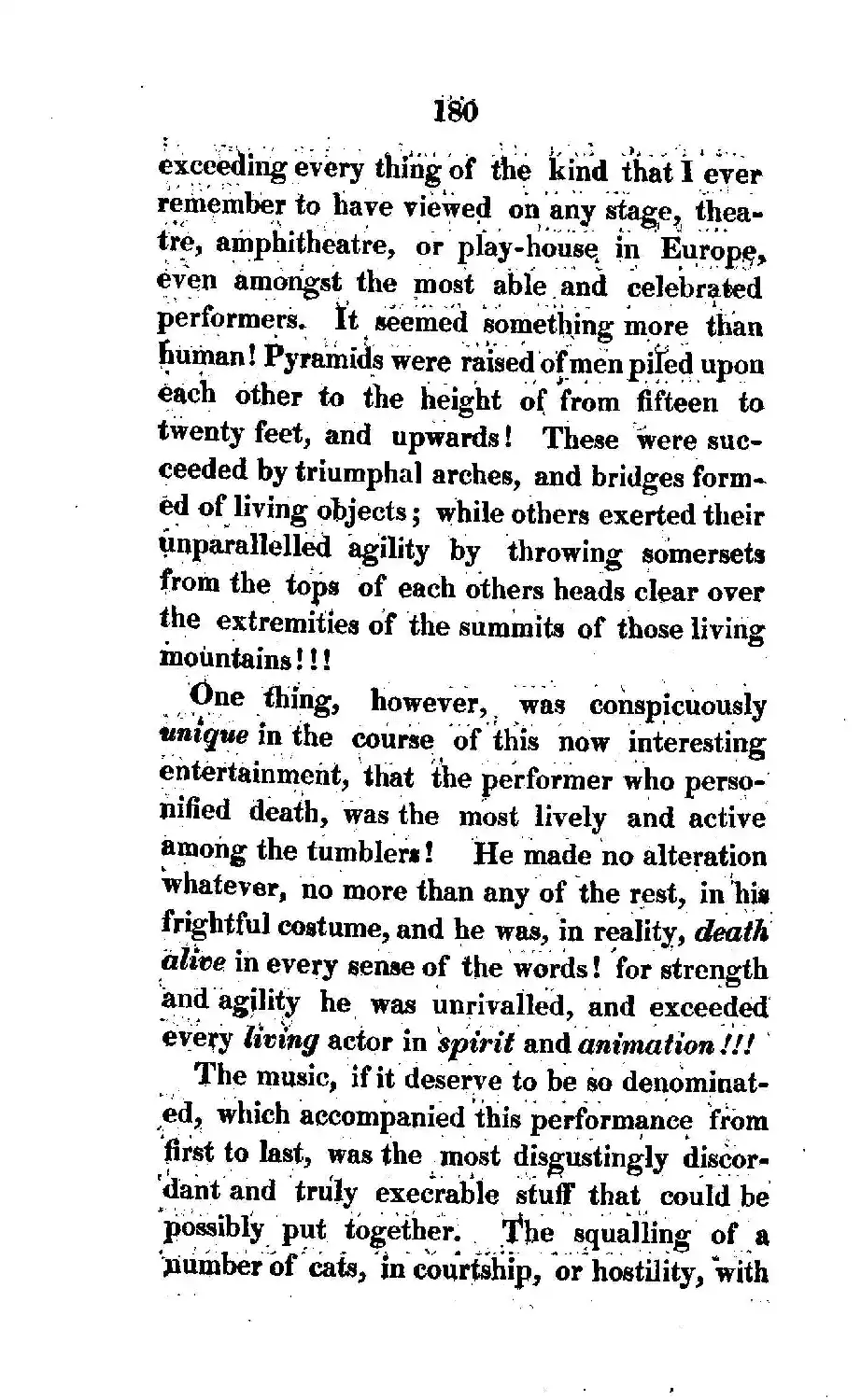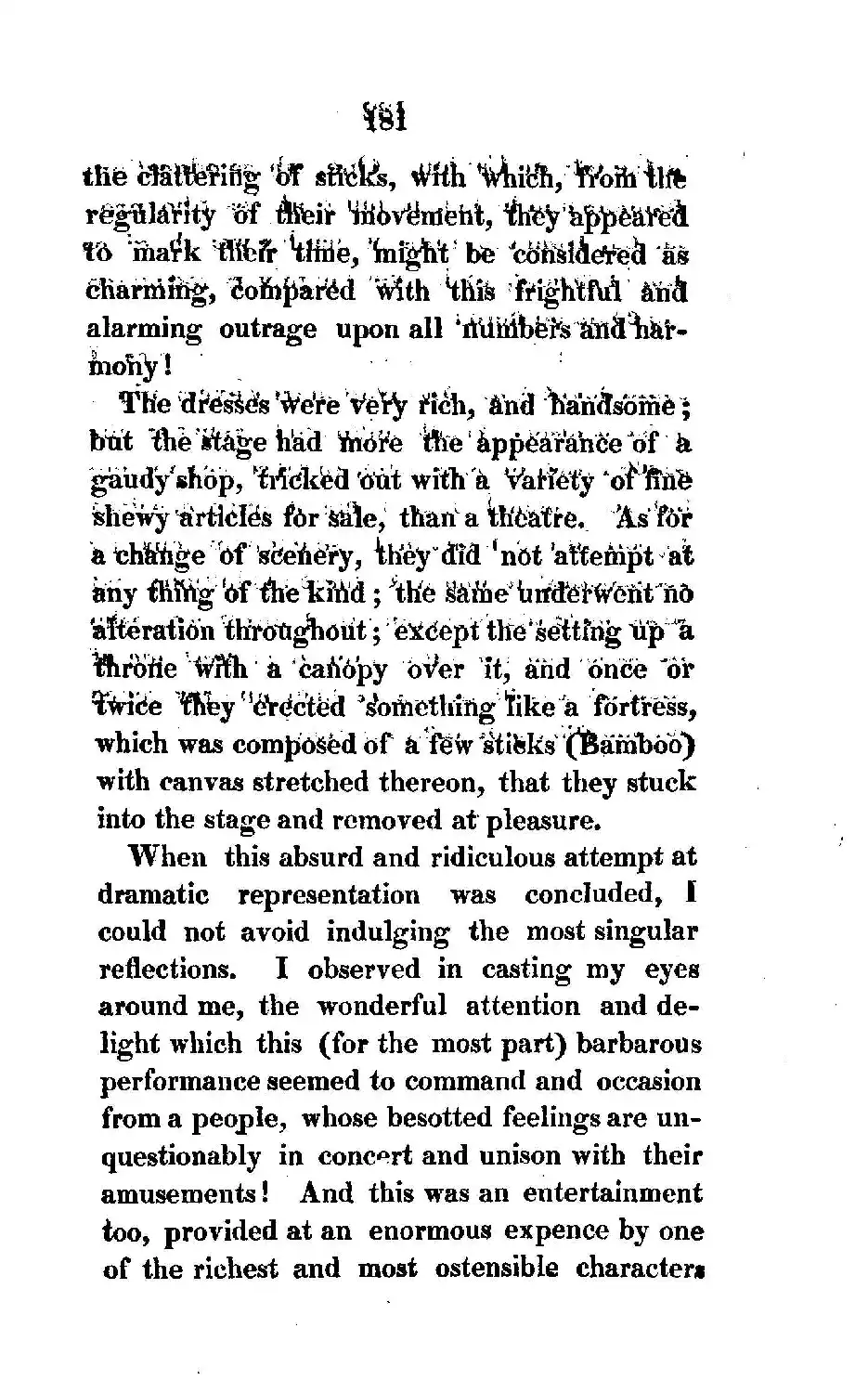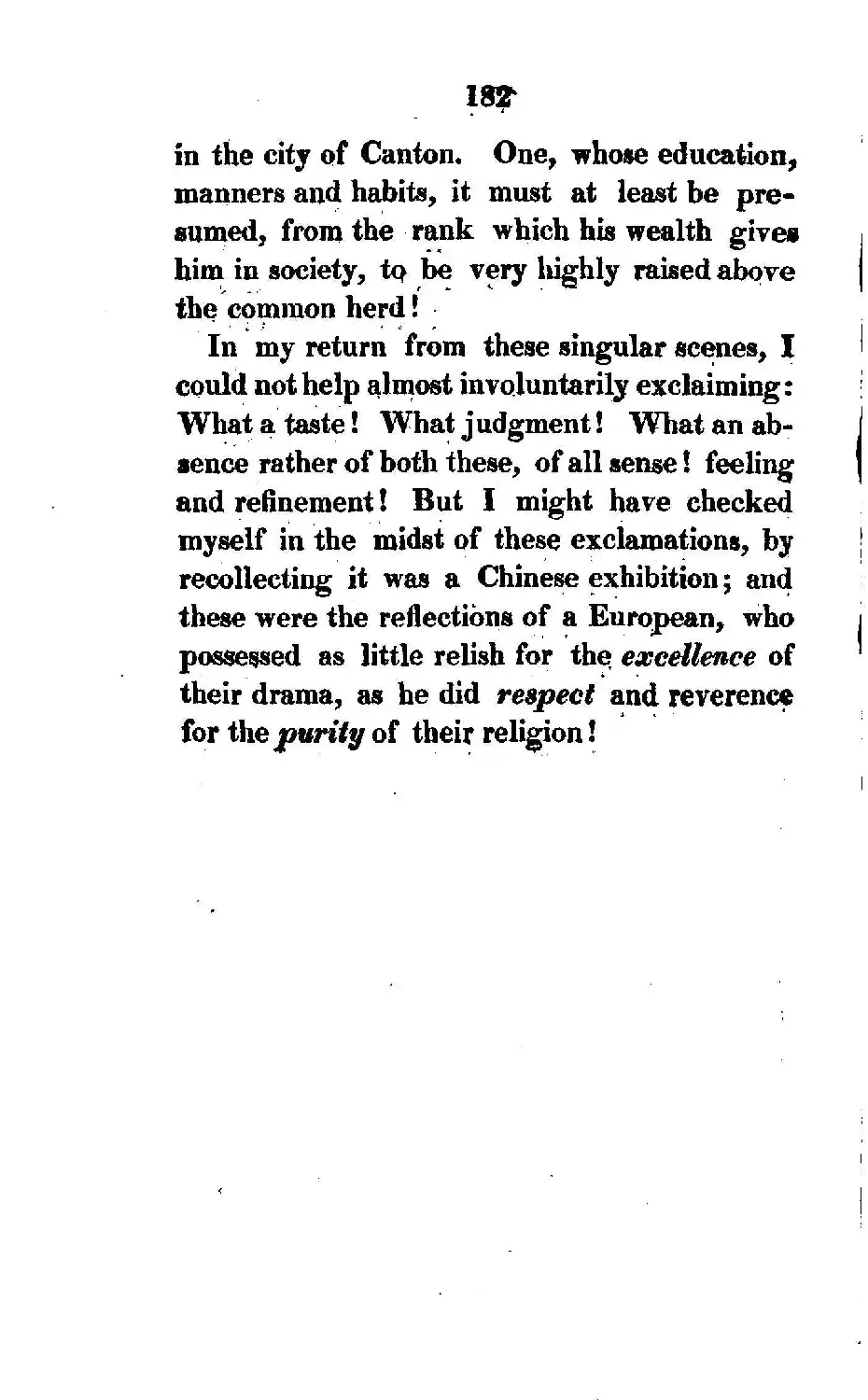Sketches of Chinese Customs and Manners in 1811-1812
- Info
- Pages
- Transcript
- Related
LETTER XVIII.
Ostentation of a Security Merchant—A Sing-Song, or Theatrical
Exhibition—Simple Plot of the Performance—Extraordinary Feats of
Activity—Chinese Music—Thoughts on the Taste of the Chinese.
Canton, Decr. 21, 1811.
Extravagance and folly are equally as pre-dominant in this, as in any of
our most polished and refined cities in Europe. If the subject I am now
to treat upon, were a criterion to judge of the wealth of the Security
Merchants here, it furnishes no proof of their prudence or taste in the
manner of dissipating the surplus of that wealth, I mean in the choice
of their public amusements; but let it be observed, that I am going to
describe an entertainment given to the public at large, and perhaps the
gout of that many-headed monster in China, was peculiarly consulted upon
the present occasion ; and yet, as it was attended by numerous
Mandarins, and persons of a higher order than the canaille. I have a
right to consider it the general ton, or taste of the whole.
Yesterday I was present at an entertainment, or sing-song as it is
termed by these people, which cost (it was reported,) 18,000 dollars!
This was given by a rich Security Merchant, of the name of Howquare. It
was the first day’s exhibition of a performance that was to continue
three days; and I attended at the particular desire of some Gentlemen
then at the Factory; particularly of my friend the Doctor, Mr. S. who
seemed to think it would greatly relieve the state of mind I was in, and
amuse it by its very singular novelty. It was a species of dramatic
spectacle openly exhibited to every one, on a stage erected at the back
part of his immense warehouses, or premises, on the banks of the river.
We ascended a flight of stairs, where we found a kind of saloon, fitted
up in rather a neat style, with an open virander for the accommodation,
we learned, of his select friends and acquaintance; and from its
position being directly opposite to the stage, afforded us a complete
view of the representation.
To attempt a critical description of the plot of the piece, which they
had commenced about an hour previous to our arrival, it would have been
an excess of vanity and presumption in me to think of for the first two
hours of observance, at least. All that my own distracted judgment could
possibly form from it was, that it comprised a kind of melange, or
medley of the various affairs of this mundane system, wherein the
different ordinary, as well as extraordinary scenes and occurrences of
life were attempted to be personified by a set of grotesque and
unnatural figures, in a most extravagant and bombastic style! Here,
then, were represented, the king and the ploughman! the debauchee and
the padre! the latter employed as the pander of the former! the warrior,
and the man of trade! the princess and the courtezan! both of which,
with all their other female characters I found were personated by men,
or boys, with discordantly squeaking falsettos! all jumbled together in
an heterogeneous confusion which both puzzled my imagination and utmost
ingenuity to discover, from the extreme absurdity of the incidents, what
could possibly be the plot, or denouement of this odd and peculiar
performance.
As they still proceeded in the action, with an unabated energy, I
redoubled my own attention to the scenes before me, to try, if possible,
to catch a glimpse of their, meaning, and thereby penetrate into their
design. Indeed, I felt inwardly ashamed, notwithstanding all I might
reasonably plead from an ignorance of the language, that I should sit so
long, and that so much time should be consumed, in unavailing efforts to
dive into the plot of a Piece, which from the satisfaction it yielded,
and the applauses it commanded from the surrounding audience, gentle as
well as simple, must have been very inteligible to capacities and
judgments meaner than my own! I even secretly blamed myself, with all
the theatrical knowledge I thought I possessed, for such palpable
stupidity!
Still the impenetrable “mystery continued to thicken!” Presently I saw a
king, in a paroxysm of resentment, strike off the head of his
confidential minister with his own hand! This deception was most
admirably managed; the head fell! the blood flowed! and the dead body
was borne off the stage by two of the attendants; while the monarch,
after perpetrating so horrid an act, with the greatest sang froid, wiped
his blood-stained sword, in a most ungraceful manner at the back of his
thigh, even as a vulgar butcher would his knife, and then took his seat
upon his throne with an equal degree of composure! All this might have
even passed off tolerably well, had not the headless trunk suddenly
found the use of its legs, in not being completely carried off by its
bearers behind the scenes!!! But that which astonished me most, was,
that such glaring absurdities, which from their ludicrous occurrence,
would have been sufficient to convulse an English audience with
laughter, was by them passed over with apathy and indifference, and
regarded merely as a matter of course!
Next appeared the empress, or queen, in the presence of her enraged
husband, accompanied by her attendants. This to her was a fatal
rencontre. She was immediately greeted upon her entrance, with a royal
salute manual, and struck down to the ground! Several of her most
strenuous advocates among her faithful attendants, or domestics, (for
their humble situations in life did not seem to restrain them in the
least from addressing offended majesty in their princess’s behalf)
shared alike his fury and resentment, and were left by him sprawling on
the stage in every direction!
This unfortunate lady was then stripped of her royal trappings, diadem,
&c. (by order of the king) under which, as if she had really anticipated
her repudiation and disgrace, she displayed, ready cut and dry, a full
and complete suit of mourning, in which she appeared, by a mournful and
impressive invocation to Joss, to call upon that deified idol to avenge
her unmerited sufferings; and these complaints were expressed by the
unhappy outcast in a pathetic song. On her exit she was met by another
queen, who, as her rival, struck her, in the king’s presence, by whom
this new favourite was welcomed and received with a degree of the most
extravagant rapture, and seated upon a throne on his left hand.
From all this it appeared that there must have existed two rival
favourites for the monarch’s affections; but whether the degraded
personage had been caught tripping with the unfortunate decapitated
minister, or had fallen a victim to the base slanders and remorseless
treachery of her more successful rival, all my most attentive
observation could not enable me to ascertain.
Certain it is that there was another party, which seemed to be in
manifest hostility and opposition to those just treated of: the members
of which it was composed were also dignified, if any correct criterion
could be formed from their regalia. There was a king and his queen, with
their court adherents, to whom the degraded princess had lied for
succour and redress. Rage and resentment predominated strikingly here,
and seemed to hold an undivided opinion in the breasts of these new
characters, who probably were the parents of the banished princess, and
revenge was the decided passion which terminated their resolutions at
this meeting. Both parties were then alternately represented animating
their troops, strengthening and exerting their resources, and preparing
for battle.
The drama now assumed quite a different feature;—and what before was
intended to convey to the auditors a representation of the histrionic
art, was now reduced to simple allegory. All the miseries and horrors of
war were now summoned upon the stage in terrific array! The brazen god
of battle then came jumping, foundering and threatening in the dance of
defiance; next to him his shocking auxiliaries blood and death,
characteristically dressed, the former in a red, and the latter in a
white mask, expressive of their several terrors! The dreadful conflict
commenced! legions opposed against legions; the din of battle, and its
horrible carnage raged for some time with inconceivable fury; the
clangour of arms, the united clash of various instruments of
destruction—swords, spears and shields: the cries of the wounded; the
dying and the slain, falling on every side! Then came the mild and
benignant goddess of peace, in supplicating posture, habited in the
virgin robes of simplicity and purity, suing for a cessation of
hostilities, and holding in her harmless hand the olive branch!
Both parties then joined together to resist her efforts; and the hostile
legions, headed by the aforesaid characteristic appearances—war, blood,
and death, assailed in coward coalition, this poor unnamed personage,
which they at first insulted and kept at bay, and then several times
struck to the earth! This very unequal contest continued for some time,
and then ceased. The bloodless pleadings of Peace, as might be
reasonably expected, notwithstanding all this guilty opposition were
ultimately triumphant, and thus closed the performance of the acting
scenes of this singular yet simple Ballet.
There was a kind of under-plot, which I could by no means fathom. A
mean, coarsely-habited plebian, who seemed at all times, and upon all
occasions, to thrust himself into all parties; to be as great with kings
as with peasants; who, notwithstanding his squallid figure, caressed and
jested with him without reserve; all his jokes were acceptable and
seemed to engross the attention and applauses of every one. This, as the
subject was allegorical, might have been perhaps a figure characteristic
of low-humour.
All the dramatic personæ then formed themselves into a group of
tumblers, which to myself, as well as every other European observer, was
by far the most amusing and pleasing part of the entertainment. Such a
surprising exertion of skill and agility united, I never witnessed.
Wonderful leaps, boundings, springs, somersets, and every other
extraordinary feat of muscular motion and elasticity, exceeding every
thing of the kind that I ever remember to have viewed on any stage,
theatre, amphitheatre, or play-house in Europe, even amongst the most
able and celebrated performers. It seemed something more than human!
Pyramids were raised of men piled upon each other to the height of from
fifteen to twenty feet, and upwards! These were succeeded by triumphal
arches, and bridges formed of living objects; while others exerted their
unparallelled agility by throwing somersets from the tops of each others
heads clear over the extremities of the summits of those living
mountains!!!
One thing, however, was conspicuously unique in the course of this now
interesting entertainment, that the performer who personified death, was
the most lively and active among the tumblers! He made no alteration
whatever, no more than any of the rest, in his frightful costume, and he
was, in reality, death alive in every sense of the words! for strength
and agility he was unrivalled, and exceeded every living actor in spirit
and animation!!!
The music, if it deserve to be so denominated, which accompanied this
performance from first to last, was the most disgustingly discordant and
truly execrable stuff that could be possibly put together. The squalling
of a number of cats, in courtship, or hostility, with the clattering of
sticks, with which, from the regularity of their movement, they appeared
to mark their time, might be considered as charming, compared with this
frightful and alarming outrage upon all numbers and harmony!
The dresses were very rich, and handsome; but the stage had more the
appearance of a gaudy shop, tricked out with a variety of line shewy
articles for sale, than a theatre. As for a change of scenery, they did
not attempt at any thing of the kind; the same underwent no alteration
throughout; except the setting up a throne with a canopy over it, and
once or twice they erected something like a fortress, which was composed
of a few sticks (Bamboo) with canvas stretched thereon, that they stuck
into the stage and removed at pleasure.
When this absurd and ridiculous attempt at dramatic representation was
concluded, I could not avoid indulging the most singular reflections. I
observed in casting my eyes around me, the wonderful attention and
delight which this (for the most part) barbarous performance seemed to
command and occasion from a people, whose besotted feelings are
unquestionably in concert and unison with their amusements! And this was
an entertainment too, provided at an enormous expence by one of the
richest and most ostensible characters in the city of Canton. One, whose
education, manners and habits, it must at least be presumed, from the
rank which his wealth gives him in society, to be very highly raised
above the common herd!
In my return from these singular scenes, I could not help almost
involuntarily exclaiming: What a taste! What judgment! What an absence
rather of both these, of all sense! Feeling and refinement! But I might
have checked myself in the midst of these exclamations, by recollecting
it was a Chinese exhibition; and these were the reflections of a
European, who possessed as little relish for the excellence of their
drama, as he did respect and reverence for the purity of their religion!
